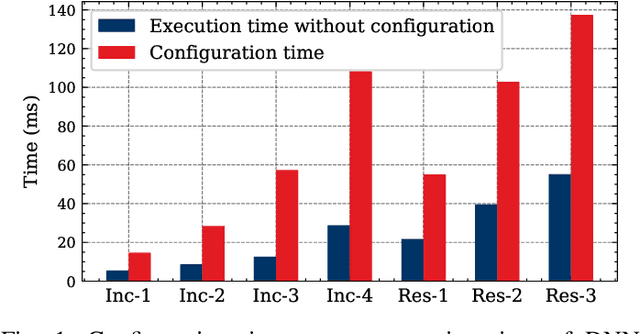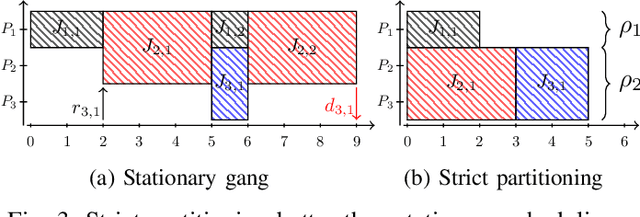Binqi Sun
Strict Partitioning for Sporadic Rigid Gang Tasks
Mar 15, 2024



Abstract:The rigid gang task model is based on the idea of executing multiple threads simultaneously on a fixed number of processors to increase efficiency and performance. Although there is extensive literature on global rigid gang scheduling, partitioned approaches have several practical advantages (e.g., task isolation and reduced scheduling overheads). In this paper, we propose a new partitioned scheduling strategy for rigid gang tasks, named strict partitioning. The method creates disjoint partitions of tasks and processors to avoid inter-partition interference. Moreover, it tries to assign tasks with similar volumes (i.e., parallelisms) to the same partition so that the intra-partition interference can be reduced. Within each partition, the tasks can be scheduled using any type of scheduler, which allows the use of a less pessimistic schedulability test. Extensive synthetic experiments and a case study based on Edge TPU benchmarks show that strict partitioning achieves better schedulability performance than state-of-the-art global gang schedulability analyses for both preemptive and non-preemptive rigid gang task sets.
Edge Generation Scheduling for DAG Tasks using Deep Reinforcement Learning
Aug 28, 2023



Abstract:Directed acyclic graph (DAG) tasks are currently adopted in the real-time domain to model complex applications from the automotive, avionics, and industrial domain that implement their functionalities through chains of intercommunicating tasks. This paper studies the problem of scheduling real-time DAG tasks by presenting a novel schedulability test based on the concept of trivial schedulability. Using this schedulability test, we propose a new DAG scheduling framework (edge generation scheduling -- EGS) that attempts to minimize the DAG width by iteratively generating edges while guaranteeing the deadline constraint. We study how to efficiently solve the problem of generating edges by developing a deep reinforcement learning algorithm combined with a graph representation neural network to learn an efficient edge generation policy for EGS. We evaluate the effectiveness of the proposed algorithm by comparing it with state-of-the-art DAG scheduling heuristics and an optimal mixed-integer linear programming baseline. Experimental results show that the proposed algorithm outperforms the state-of-the-art by requiring fewer processors to schedule the same DAG tasks.
 Add to Chrome
Add to Chrome Add to Firefox
Add to Firefox Add to Edge
Add to Edge